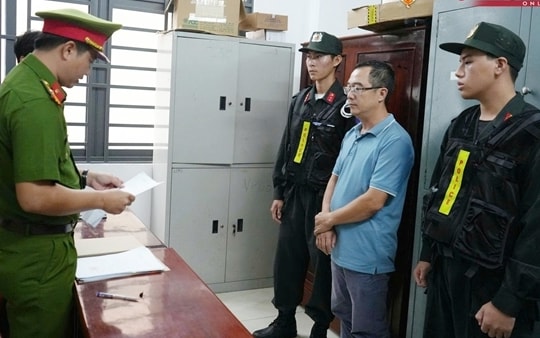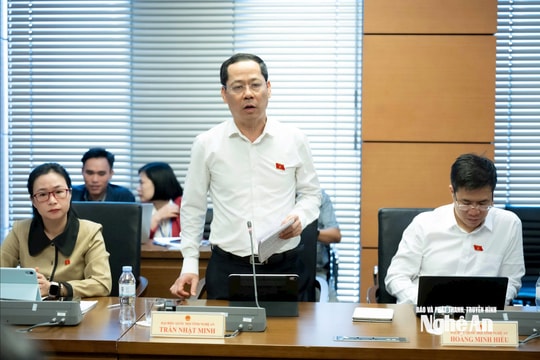Nghe An issues Regulations on decentralization of salary management for cadres, civil servants and public employees
(Baonghean.vn) - This regulation stipulates the responsibilities and powers of the Provincial Party Committee, the Provincial Party Committee Standing Committee, the Provincial Party Committee Organization Committee, the district, city, town Party Committees, the Party Committees and units under the Provincial Party Committee, the Party Committee of the Provincial People's Committee on salary management for cadres, civil servants and public employees.
The Standing Committee of Nghe An Provincial Party Committee has just issued Regulation No. 04/QD-TU on decentralization of salary management for cadres, civil servants, public employees of Party agencies, the Fatherland Front, socio-political organizations and public service units under the Provincial Party Committee; state officials under the management of the Standing Committee of the Provincial Party Committee, with specific contents as follows:
Regarding applicable subjects:
a) Cadres, civil servants, public employees of Party agencies, the Fatherland Front, socio-political organizations and public service units under the Provincial Party Committee.
b) Cadres, civil servants, and public employees under the Provincial Party Standing Committee managing administrative agencies and public service units in the state sector.
Salary management content:
1. Salary increase, salary transfer, position allowance and salary allowances for cadres, civil servants and public employees.
2. Promotion, transfer of ranks, change of professional titles for cadres, civil servants and public employees.
3. Build salary fund (if any).
4. Salary statistics report.
5. Check, monitor and evaluate the implementation of salary regimes and policies.
Principles of salary management:
1. Comply with regulations on salary regime and regulations on management of civil servant and public employee ranks according to current regulations.
2. Ensure accurate and timely implementation of salary and salary allowance regimes, rank appointment, rank transfer and salary arrangement for cadres, civil servants and public employees.
3. The head of the agency or unit shall manage salaries according to decentralization regulations.
On responsibilities and authorities:
The Standing Committee of the Provincial Party Committee authorizes the Standing Committee of the Provincial Party Committee to:
1. Salary management for cadres, civil servants, public employees of Party agencies, the Fatherland Front, socio-political organizations and public service units under the Provincial Party Committee.
a) Decision on salary increase, seniority allowance, position allowance, and rank transfer for cadres under the management of the Provincial Party Committee Standing Committee.
b) Decision on salary increase, seniority allowance beyond the framework, and transfer of ranks for cadres, civil servants, and public employees with salary ranks from senior specialist or equivalent or higher.
c) Decide on the appointment of senior specialist ranks and salary arrangements for selected officials, civil servants and public employees after receiving consensus from the Central Organizing Committee.
d) Decision on appointment to the rank of senior specialist or equivalent for cadres, civil servants and public employees who pass the promotion exam.
d) Submit to the Central Organizing Committee for consideration of upgrading the ranks and promoting to senior experts or equivalent without taking an exam for qualified officials, civil servants and public employees according to regulations.
e) Sending cadres, civil servants and public employees to participate in exams to upgrade their ranks and consider promotion from the rank of senior specialist or equivalent to the rank of senior specialist or equivalent.
g) Issue a project for rank promotion exams and promotion consideration; direct the organization of rank promotion exams and promotion consideration from specialist or equivalent to senior specialist or equivalent; from staff to specialist or equivalent; from staff to staff (after the Central Organizing Committee has given opinions on the content of the project and rank promotion targets).
2. Salary management for cadres under the management of the Provincial Party Standing Committee in administrative agencies and public service units of the state sector.
a) Give opinions on the implementation of salary increase and seniority allowance beyond the framework for cadres under the management of the Provincial Party Standing Committee.
b) Give opinions on sending cadres to take exams, consider upgrading ranks, consider promotions and appoint ranks, transfer to senior expert ranks or equivalent for cadres under the management of the Provincial Party Standing Committee.
Responsibilities and powers of the Provincial Party Committee's Organizing Committee:
1. Advise and manage salaries for cadres, civil servants, public employees of Party agencies, the Fatherland Front, socio-political organizations and public service units under the Provincial Party Committee.
a) Appraise and submit to the Standing Committee of the Provincial Party Committee for decision on salary increase, seniority allowance beyond the framework, position allowance, and rank transfer for cadres under the management of the Standing Committee of the Provincial Party Committee.
b) Appraise and submit to the Standing Committee of the Provincial Party Committee for decision on salary increase, seniority allowance beyond the framework, and transfer of ranks for cadres, civil servants, and public employees with salary ranks from senior specialist or equivalent or higher.
c) Appraise the submissions and documents of the requesting units and notify the results in writing on the implementation of the salary increase regime, seniority allowance beyond the framework, first-time professional allowance, and rank transfer for cadres, civil servants, and public employees with salary grades from specialist or equivalent or lower for the units to implement.
d) Appraise and advise the Standing Committee of the Provincial Party Committee to submit to the Central Organizing Committee for consideration of upgrading the ranks and promoting senior experts or equivalent without taking exams for qualified officials, civil servants and public employees according to regulations.
d) Appraise, advise, and submit to the Standing Committee of the Provincial Party Committee to nominate cadres, civil servants, and public employees to participate in the exam to upgrade their ranks and consider promotion from the rank of senior specialist or equivalent to the rank of senior specialist or equivalent.
e) Advise on developing a project for rank promotion exams and promotion consideration; advise on organizing rank promotion exams and promotion consideration from specialist rank or equivalent to senior specialist rank or equivalent; from staff rank to specialist rank or equivalent; from staff rank to staff rank (after the Central Organizing Committee has given opinions on the content of the project and rank promotion targets).
g) Advise and submit to the Standing Committee of the Provincial Party Committee to decide on the appointment of ranks and salary arrangement for senior experts or equivalent for selected cadres, civil servants and public employees after receiving consensus from the Central Organizing Committee.
h) Advise and submit to the Standing Committee of the Provincial Party Committee to decide on the appointment of ranks and salary arrangement for senior specialists or equivalent for cadres, civil servants and public employees who pass the promotion exam.
i) Decision on appointment to ranks and salary arrangement for specialists or equivalent; appointment to ranks and salary arrangement for officials, civil servants and public employees who pass the promotion exam.
k) Perform other tasks according to the responsibility and authority of salary management decentralization.
2. Advise and manage salaries for officials under the management of the Provincial Party Standing Committee in administrative agencies and public service units of the state sector.
a) Review and submit to the Standing Committee of the Provincial Party Committee for comments on the implementation of salary increase and seniority allowance beyond the framework for cadres under the management of the Standing Committee of the Provincial Party Committee; notify in writing the opinion of the Standing Committee of the Provincial Party Committee for competent authorities to decide.
b) Appraise and submit to the Standing Committee of the Provincial Party Committee for opinions on sending cadres to take exams, consider upgrading ranks, consider promotion and appointment, transfer to senior expert ranks or equivalent for cadres under the management of the Standing Committee of the Provincial Party Committee; notify in writing the opinions of the Standing Committee of the Provincial Party Committee for competent authorities to decide.
Responsibilities and powers of district, city, town Party Committees, Party Committees and units directly under the Provincial Party Committee:
1. Appraise and submit to the Provincial Party Committee's Organizing Committee the salary increase, seniority allowance beyond the framework, first-time job allowance, and rank transfer for cadres, civil servants, and public employees of Party agencies, the Fatherland Front, socio-political organizations, and public service units under the Provincial Party Committee; issue salary decisions for cadres, civil servants, and public employees from specialist level and equivalent or lower after receiving notification of the results from the Provincial Party Committee's Organizing Committee.
2. Decide on position allowances for cadres, civil servants, public employees of Party agencies, the Fatherland Front, socio-political organizations and public service units under the Provincial Party Committee according to the cadre management decentralization.
3. Decide on annual vocational allowances for cadres, civil servants, public employees of Party agencies, the Fatherland Front, socio-political organizations and public service units under the Provincial Party Committee.
4. Perform other tasks according to the responsibility and authority of salary management hierarchy.
Responsibilities of the Party Executive Committee of the Provincial People's Committee:
1. The Provincial People's Committee leaders shall appraise and submit to the Provincial Party Standing Committee for comments on salaries for state officials under the management of the Provincial Party Standing Committee.
2. The leaders of the Provincial People's Committee shall appraise and submit to the Standing Committee of the Provincial Party Committee for comments on sending officials to participate in the examination for promotion, consideration for promotion and appointment to senior expert rank or equivalent for state officials under the management of the Standing Committee of the Provincial Party Committee.
Time to implement regular salary increase, seniority allowance beyond the framework, professional allowance is implemented periodically every quarter, specifically:
- Deadline for submitting documents to the Provincial Party Committee's Organizing Committee is before the 15th of the middle month of the quarter.
- The competent authority shall issue salary decisions before the 15th of the first month of the following quarter (after receiving comments from the Standing Committee of the Provincial Party Committee or notification from the Provincial Party Committee's Organization Committee according to salary management decentralization).
Early salary increase due to excellent performance in annual work is carried out in the fourth quarter and at the latest in the first quarter of the following year.
Every 6 months and every year, units report in writing the results of the implementation of the salary regime for cadres, civil servants and public employees under their management to the Provincial Party Committee's Organization Board at the end of July of the reporting year and at the end of January of the following year; the Provincial Party Committee's Organization Board reports the annual implementation results in writing to the Central Party Committee's Organization Board at the end of the first quarter of the following year; reports and builds a salary fund when requested by the superior management level.
The Provincial Party Standing Committee assigns the Party Committee of the Provincial People's Committee; Party building committees, the Inspection Committee and the Provincial Party Office; district, city and town Party Committees; the Party Committee of the Provincial Agencies Bloc; the Party Committee of the Provincial Enterprises Bloc; the Provincial Fatherland Front Committee and provincial-level socio-political organizations, and public service units under the Provincial Party Committee to organize implementation based on the Regulations.
This regulation takes effect from the date of signing (July 1, 2021). Abolishes documents previously prescribed by the Provincial Party Standing Committee on salary management decentralization for cadres, civil servants, public employees of Party agencies, the Fatherland Front, socio-political organizations and public service units under the Provincial Party Committee; state officials under the management of the Provincial Party Standing Committee.









